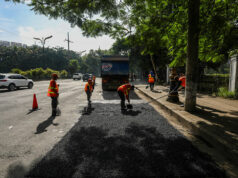House panel focusing on pushing POGO, road user taxes to plenary
THE House committee on ways and means will seek to elevate to the plenary legislation laying down tax measures for online gaming firms, road users, the mining industry and single-use plastics, its chairman said.
Representative Jose Ma. Clemente S. Salceda, the committee’s chairman who holds the seat for the second district of Albay, told reporters Monday that the panel “will sustain its commitment to funding the President’s key infrastructure and human development priorities. To this end, we will keep our push for passage in plenary of key tax bills that the Committee has already passed, namely 1. POGO tax regime, 2. Motor Vehicle Road Users’ Tax, 3. Mining Fiscal Regime, 4. Tax on single-use plastics.”
Mr. Salceda, who issued the statement via Viber message, was referring to online gambling firms, known as Philippine Offshore Gaming Operators (POGOs).
The expected revenue to be generated by each tax bill is P20 to 45 billion from POGOs, P16 billion from the road tax, P2 billion from the mining tax, and P4 billion from the tax on single-use plastics.
The committee will also study structural reforms and the digital transformation of the Bureau of Internal Revenue and the Bureau of Customs.
“The aim, ultimately, is to encourage tax compliance and deter tax avoidance. With a few tweaks in the taxpayer experience, even if we improve compliance by just 1% of total BIR collections, that is already a revenue increase of about P22 billion. We can of course do much more” Mr. Salceda added.
According to Mr. Salceda, another important priority for the committee is to pass the Corporate Income Tax and Incentives Rationalization Act (CITIRA), which he called the “single most important economic reform” in the post-1986 period.
“As the first proponent of a governing body for incentives, for me, one of the most crucial aspects of the reform will be the Fiscal Incentives Review Board (FIRB). No FIRB makes CITIRA meaningless. It’s the people’s seat at the table. Without reform, we will likely hit P500 billion in tax incentives next year, while still making domestic corporations pay the highest tax rates in ASEAN” Mr. Salceda said, adding that CITIRA may be passed by the Senate within the first two months of 2020.
CITIRA, which aims to gradually cut the corporate income tax rate to 20% from the current 30%, was approved on third and final reading at the House of Representatives on Sept. 13.
Mr. Salceda also noted that the Passive Income and Financial Intermediaries Tax (PIFITA) and the Real Property Valuation and Assessment Reform Act (RPVRA) will be passed in 2020.
“PIFITA will unlock the potential of our capital markets and encourage ordinary Filipinos to invest for their future. RPVRA will help complete Build, Build, Build by expediting right of way acquisition. Both are definitely crucial for growth,” Mr. Salceda said.
The House of Representatives passed PIFITA on third and final reading in September. It will decrease tax rates on interest income from savings and short-term deposits to 15% from the current 20%. Tax rates on interest income from foreign currency deposits and long-term deposits would also be lowered to 15%.
By 2022, Mr. Salceda hopes the reforms help the Philippines achieve an A-level credit rating, alongside 8% Gross Domestic Product (GDP) growth and “widespread prosperity.” — Genshen L. Espedido



